Class 10 ICSE Physics Refraction through Plane Surface Most Likely Questions
Here we provide Class 10 physics important notes,board questions and predicted questions with Answers for chapter Refraction through Plane Surface. These important notes,board questions and predicted questions are based on ICSE board curriculum and correspond to the most recent Class 10 physics syllabus. By practising these Class 10 materials, students will be able to quickly review all of the ideas covered in the chapter and prepare for the Class 10 Board examinations.
Class 10 ICSE Refraction through Plane Surface Most Likely Questions
Refraction through Plane Surface Most Likely Questions
Q1
(a) For which colour of white light, is the refractive index of a transparent medium (i) the least
(ii) the roost? (b) Which colour of light travels fastest in any medium except air?
solutions
solutions

Q2
What is lateral displacement? Draw a ray diagram showing the lateral displacement of a ray of light
when it passes through a parallel sided glass slab.
solutions
solutions

Q3
In the adjacent diagram, AO is a ray of light incident on a rectangular glass slab.
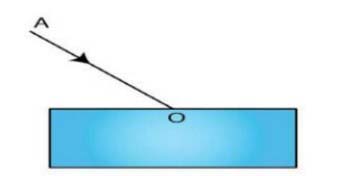
(a) Complete the path of the ray till it emerges out of the slab.
(b) In the ray diagram, mark the angle of incidence (i) and the angle of refraction (r) at the first interface. How is the refractive index of glass related to angles i and r ?
(c) Mark angle of emergence by the letter e. How are the angles i and e related?
(d) Which two rays are parallel to each other? Name them.
(e) Indicate in the diagram the lateral displacement between the emergent ray and the incident ray. State one factor that affects the lateral displacement.
solutions


(a) Complete the path of the ray till it emerges out of the slab.
(b) In the ray diagram, mark the angle of incidence (i) and the angle of refraction (r) at the first interface. How is the refractive index of glass related to angles i and r ?
(c) Mark angle of emergence by the letter e. How are the angles i and e related?
(d) Which two rays are parallel to each other? Name them.
(e) Indicate in the diagram the lateral displacement between the emergent ray and the incident ray. State one factor that affects the lateral displacement.
solutions


Q4
The diagrams (a) and (b) in Fig. below show the refractions of a ray of light of single colour
through a prism and a parallel sided glass and prism, respectively.
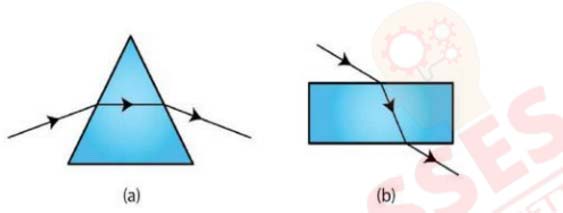
(a) In each diagram, label the incident, refracted, emergent rays and the angle of deviation.
(b) In what way the direction of emergent ray in the two cases differ with respect to the incident ray? Explain your answer.
solutions

(a) In each diagram, label the incident, refracted, emergent rays and the angle of deviation.
(b) In what way the direction of emergent ray in the two cases differ with respect to the incident ray? Explain your answer.
solutions

Q5
A student puts his pencil into an empty trough and observes the pencil from the position as
indicated in the Fig.
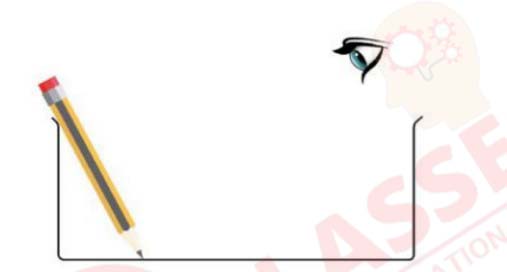
(i) What change will be observed in the appearance of the pencil when water is poured into the trough?
(ii) Name the phenomenon which accounts for the above started observation.
(iii) Complete the diagram showing how the student's eye sees the pencil through water.
solutions

(i) What change will be observed in the appearance of the pencil when water is poured into the trough?
(ii) Name the phenomenon which accounts for the above started observation.
(iii) Complete the diagram showing how the student's eye sees the pencil through water.
solutions

Q6
Fig. shows a point source P inside a water container. Three rays A. B and C starting from the source
P are shown up to the water surface.
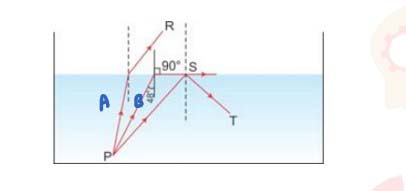
(a) Show in the diagram, the path of these rays after striking the water surface. The critical angle for water-air surface is 48°.
(b) Name the phenomenon which the rays A, B and C exhibit.
solutions

(a) Show in the diagram, the path of these rays after striking the water surface. The critical angle for water-air surface is 48°.
(b) Name the phenomenon which the rays A, B and C exhibit.
solutions

Q7
In Fig., a ray of light PQ is incident normally on the face AB of an equilateral glass prism.
Complete the ray diagram showing its emergence into air after passing through the prism. Take
critical angle for glass = 42°
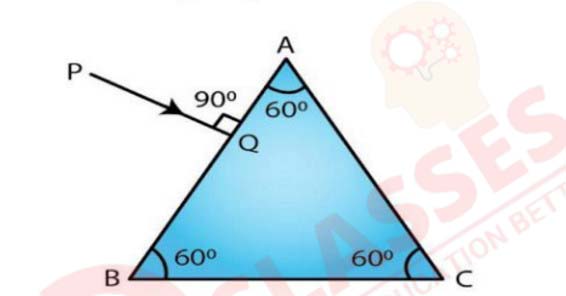
(a) Write the angles of incidence at the faces AB and AC of the prism.
(b) Name the phenomenon which the ray of light suffers at the face AB, AC and BC of the prism.
solutions

(a) Write the angles of incidence at the faces AB and AC of the prism.
(b) Name the phenomenon which the ray of light suffers at the face AB, AC and BC of the prism.
solutions


Reach Us
SERVICES
- ACADEMIC
- ON-LINE PREPARATION
- FOUNDATION & CRASH COURSES
CONTACT
B-54, Krishna Bhawan, Parag Narain Road,
Near Butler Palace Colony Lucknow
Contact:+918081967119

Add a comment